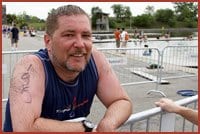The look on their faces as they burst through the finishing line says it all. On one face, there is a scream. On another, a smile. The third seems to be savouring the feeling of accomplishment after enduring two gruelling hours of swimming, biking and running to complete the sprint triathlon’s requirements.
Christopher Luesby, David Pepper and Christine Schulz are giving it their best at the Outgames Aug 3.
Luesby, a six-foot, thin man, wearing a black bandana, virtually gushes his excitement in an interview after the event.
“For me, it’s about challenging yourself, and not to be scared to do it, and to have fun and not worry if you are going to be the last person.”
Over 250 participants take part either in the Olympic route or in the shorter version, the sprint route.
Sprint triathletes start at 9am. Mark Tewksbury is at the Olympic basin to get them on their way. In white and red bathing caps, men are the first to start; women depart five minutes later.
As the athletes head down the basin, their arms move like the wings of a bird in the distance.
A Montrealer is the first to finish the 750-metre swim leg of the race after 13 minutes in the water.
Each athlete emerges from the water, looking daze and trying to focus on the next leg, a 20-kilometre bike race at the Gilles Villeneuve circuit.
Only five kilometres into the bike race, Pepper has a flat tire. He peddles on.
On his red bike, Luesby rings his bell and waves at the crowd.
“I’d ring the bell and say that’s one lap!” he explains later, a real intensity in his voice. “And people would remember. I’ve been a volunteer for many events. It’s fun for the people who are there to cheer you on, and if you cheer them on, you get 10 times more back. It takes away some of the stress of, ‘Oh my god, I’m competing.'”
Exiting the racetrack is confusing. Some have to stop completely while others are sent underneath the yellow ribbon and back to the transition spot for the five kilometre run, the last leg of the race.
Schulz’s knees ache. She did not have the proper training for the run. Like Luesby, she is a last-minute participant in the event.
The event finishes at 11am — earlier than expected.
Schulz finishes fifth in the women’s 35-39 years-old category. Pepper finishes 13th in the men’s 40-44 years-old competition while Luesby comes 10th in the men’s 45-49 years-old category.
Pepper arrives at the finish with his eyes closed, looking up at the sky.
At the finish line, he puts his hands on his knees. “It’s exhilarating,” he gasps. He feels good about his accomplishment after four months of preparation.
Exhausted, he eventually lies down at the dock for several minutes. Soon, he dives into the water to join other athletes cooling off.
Leusby’s still on a high.
“Everyone should consider doing one major sport event in their life,” he says. “It can change your sense of who you are and what you’re capable of, it’s quite amazing.”
The same day, a spectacular performance by three Ottawans in the Olympic triathlon on earns them gold in the mixed medley, a victory that they didn’t expect.
Together Ted Mann, Lise Hebert and Mike Graydon join forces and compete in the mixed race category starting at 8:02am.
Mann swims the 1.5 km race at the Olympic basin, Hebert rides her bike for the 40 km at the Gilles Villeneuve circuit racetrack, while Graydon runs for 10 km.
“I was not doing it to get medals,” says Mann in a later phone interview. “I wanted to be part of our community. I didn’t expect to get a medal on top of that.”
His only complaint is the large weeds in the water. “Atrocious,” he says, an unfortunate addition to the usual hassle of being kicked and punched by other swimmers.
At the finish line, participants were holding hands and sharing hugs.
“That mutual support is wonderful to see,” says Mann.
“I was reminded in Montreal how important the games is to our community, particularly in sports.”
Over 250 athletes registered for the combined triathlon meet.
Ottawa area athletes Pu Chen and Heather Pardon also competed in the Olympic or sprint race.

 Why you can trust Xtra
Why you can trust Xtra


